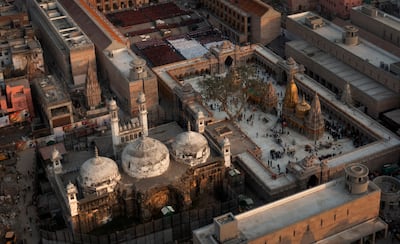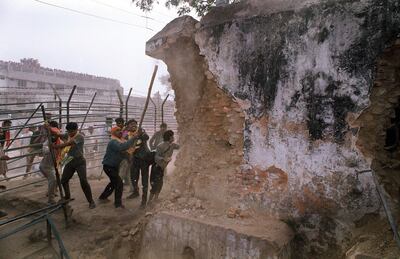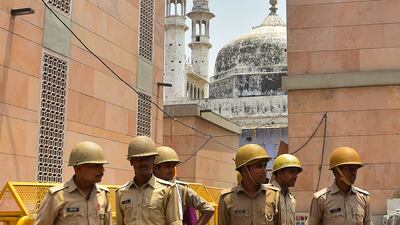India's opposition leaders and political commentators are concerned about a fresh surge in sectarian tensions after a court ruling that admitted a lawsuit by five Hindu women pleading their right to pray in a medieval mosque.
A court on Monday rejected the Muslim mosque committee plea challenging the lawsuit filed by Hindus seeking free access to perform religious rituals in the historic Gyanvapi Mosque, in the Hindu holy city of Varanasi in Uttar Pradesh.
The committee had argued that the lawsuit was infructuous as all ancient religious sites in the country were protected under the Places of Worship Act 1991.
The legislation was passed to protect historical but contentious religious sites and mandates that the nature of all places of worship are maintained as they were on the day India gained freedom from British rule in 1947.

But as soon as the judge upheld the lawsuit on Monday, Hindu petitioners and their supporters broke into an impromptu celebration outside the courtroom, hailing the ruling as a first step to reclaiming the “historic temple”, as the court fixed a hearing for next week to determine whether Hindus can be allowed to pray inside the mosque.
Top officials from Prime Minister Narendra Modi’s Hindu nationalist Bharatiya Janata Party (BJP)-led state government were also quick to welcome the court ruling, as they aim to consolidate the Hindu vote before the 2024 national elections.
However, the court ruling has triggered alarm among the country’s Muslim population, with leading community politicians saying the court order will be used to harass Muslims and open the floodgates for similar litigations.
Mehbooba Mufti, a politician from the disputed Kashmir region, said the court’s verdict would lead to an upsurge in sectarian tensions and help Mr Modi’s party to further polarise the country.
“The court ruling on Gyanvapi despite Places of Worship Act will lead to rabble-rousing and create a communal atmosphere which ironically plays into the BJP’s agenda. It is a sorry state of affairs that courts don’t follow their own rulings,” Ms Mufti said on Tuesday.
Asaduddin Owaisi, another prominent Muslim politician, said the ruling would set a precedent, with similar litigations likely to be filed to take over Islamic structures.
“After today's order, it seems there will be more litigation on this issue and we will be back to the '80s and it will create a destabilising effect,” Mr Owaisi said.
The warnings came as the Hindu radical group Akhil Bharat Hindu Mahasabha on Tuesday filed a petition seeking the removal of the Meena Masjid, part of the Shahi Idgah Mosque in Mathura.
Many Hindus claim the mosque was built by Mughal emperor Aurangzeb by demolishing the birthplace of the deity Lord Krishna.
Mr Modi’s party and several radical Hindu groups in India have long campaigned to reclaim scores of Islamic monuments that they believe were either built after destroying Hindu temples, including Unesco world heritage sites such as the Taj Mahal and Qutub Minar.
Hindus claim the 17th-century Gyanvapi mosque was built over the ancient Vishweshwar temple — dedicated to the Hindu god Shiva.
A group of Hindu priests filed a legal suit in 1991 to reclaim the site but the case remained dormant until 2019 when a local Hindu leader filed another plea to pray inside the mosque.
Hindus were allowed to worship the deities carved on the outer wall of the Gyanvapi mosque every day until 1993, but such rituals were restricted to once a year after Hindu mobs demolished Babri Masjid.

However, a separate plea by the group of five Hindu women was filed demanding the right to pray inside the complex in 2021.
The court in its ruling on Monday said the petitioners were only seeking the right to worship as a civil right at the “disputed” property, and not the conversion of the mosque to a temple, despite the Muslim side arguing that the lawsuit violated the Places of Worship Act.
A separate lawsuit demanding that Muslims should be barred from entering and using the mosque will be heard next month by another Varanasi court.
The flurry of court cases follow the Supreme Court’s judgment in 2019 that awarded a piece of land to Hindus in Ayodhya for the construction of a grand temple at the site where the medieval Babri Masjid Mosque once stood.
Hindus claimed the 14th century mosque was built by the founder of the Mughal dynasty in India, over the site that they believed was the birthplace of Lord Ram.
A decades-long legal battle dating back to the British colonial times continued until tens of thousands of Hindus rampaged in Ayodhaya and tore down the mosque in December 1992, followed by months of sectarian violence that killed at least 2,000 people.
The long campaign for the construction of a temple and widespread violence prompted the government to bring in laws such as the Places of Worship Act to prevent further disputes.
But it had helped Mr Modi’s BJP to consolidate its Hindu voter base and increase its electoral tally in the national parliament from two seats in 1984 to 85 in 1989.
Asim Ali, a researcher at the Centre for Policy Research, a Delhi-based think tank, said the latest court decision will set a “template” for similar litigations by the ruling party and right-wing Hindu groups.
“This will set a template for other people for new petitions. It would lead to polarisation and even though the ruling party won’t do it openly, there are many Hindu groups who will exploit it,” Mr Ali told The National.


